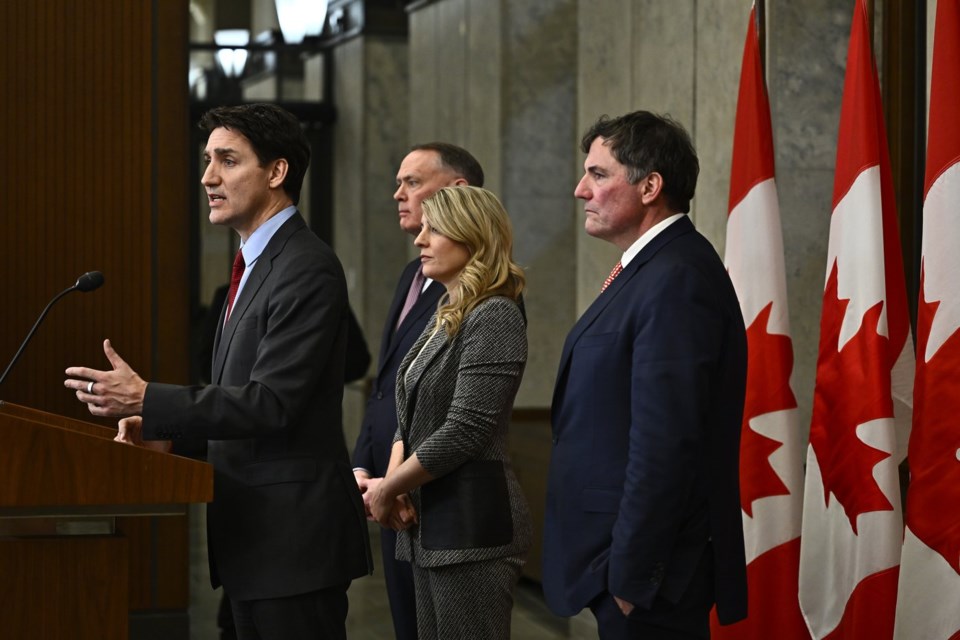OTTAWA — Ottawa is imposing 25 per cent tariffs on hundreds of goods originating in the United States — from meat and milk to carpets and curtains — in response to steep new American levies against Canada.
The federal government released a detailed list of the retaliatory tariffs on $30 billion in goods Sunday, less than 24 hours after U.S. President Donald Trump forcibly dragged Canada into an unprecedented trade war.
Trump signed executive orders Saturday evening to hit America's closest neighbour with damaging duties of 10 per cent on energy and 25 per cent on everything else.
Canada's initial response takes effect Tuesday, when the U.S. tariffs are applied.
In three weeks Ottawa plans to add another $125 billion in tariffs on hundreds of other U.S. goods after consulting with industry.
It says the second list will include products such as cars, trucks, buses, steel and aluminum, aerospace products, and fruits and vegetables.
The government is also taking steps to ease the effects of the countermeasures on Canadians by launching a process to allow businesses to request exceptional relief from the tariffs.
Many Canadians weren't waiting for the government to retaliate, taking to social media to announce they have cancelled subscriptions to U.S. streaming services, pledging not to travel south, and sharing lists and videos of Canadian-made items to help each other avoid buying American brands.
Politicians are pushing the buy-Canadian plan as well.
"Now is the time to choose products made right here in Canada," Prime Minister Justin Trudeau posted Sunday on X. "Check the labels. Let’s do our part. Wherever we can, choose Canada."
Liberal leadership candidate and former finance minister Chrystia Freeland also issued a statement urging Canadians to "try your best not to buy products made in the United States."
The premiers of both Ontario and Newfoundland and Labrador confirmed Sunday that U.S. products will be removed from their provincial liquor stores on Tuesday.
The LCBO, Ontario's alcohol wholesaler, will also scrub American products from its catalogue so that Ontario-based restaurants and sellers can't order or restock them.
British Columbia Premier David Eby made a similar move Saturday directing the BC Liquor Distribution Branch to immediately stop buying American liquor from “red states,” and to pull existing stock from store shelves.
Trudeau said additional non-tariff measures were being discussed by the federal and provincial governments "including some relating to critical minerals, energy, procurement and other partnerships."
However he did not say whether that included cutting energy supplies to the U.S, saying instead any measures that involve one region of the country more than others will be done "carefully" and with the full partnership of regional leaders.
Alberta Premier Danielle Smith has been staunchly against any retaliation that touches her province's oil and gas industry.
The prime minister said the better option for both countries is to avoid tariffs altogether.
"If President Trump wants to usher in a new golden age for the United States, the better path is to partner with Canada, not to punish us," Trudeau said.
Conservative Leader Pierre Poilievre on Sunday urged the Liberal government to recall Parliament to put in place a “Canada first” plan to handle the economic repercussions from the tariffs.
Trudeau prorogued Parliament in early January to allow for his party to choose a new leader to replace him. The Liberal leadership will be decided March 9 but the House of Commons isn't scheduled to return until March 24.
Poilievre proposed retaliating "dollar for dollar" by targeting industries that will have a maximum impact on the United States while harming Canadian consumers as little as possible.
Trump took to social media Sunday to reiterate his false claim that America subsidizes Canada. He pushed his plan for Canada to become "our cherished 51st state" to avoid tariffs.
"We don’t need anything they have," Trump posted. "We have unlimited energy, should make our own cars, and have more lumber than we can ever use. Without this massive subsidy, Canada ceases to exist as a viable country."
The president linked the levies to fentanyl crossing the border and included a retaliation clause that says if Canada responds with duties on American products, the levies could be increased.
U.S Customs and Border Protection statistics show less than one per cent of all fentanyl seized comes from the northern border.
The new trade penalties could upend the Canadian economy and spur American inflation, even though the U.S. president campaigned on making life more affordable.
Trump has played down the impact of import taxes on American citizens. He acknowledged Friday that "there could be some temporary short-term disruption" but said "people will understand that."
The U.S. Chamber of Commerce said Saturday the tariffs will "only raise prices for American families and upend supply chains."
— With files from Kelly Geraldine Malone in Washington, Nono Shen in Vancouver, Morgan Lowrie in Montreal and The Associated Press
This report by The Canadian Press was first published Feb. 2, 2025.
Jim Bronskill, The Canadian Press




